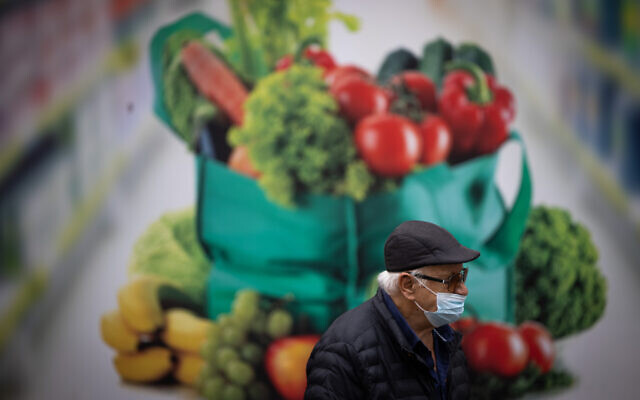Transmission number climbs to 1.28; ministers, health officials to formulate plan for tightening restrictions on gatherings, public activities

There were, according to Health Ministry figures published Tuesday, 1,306 new COVID-19 cases diagnosed the day before, the highest daily caseload in two months.
The figure came as cabinet ministers and health officials warn that the highly infectious Omicron coronavirus variant is driving what will be the fifth wave of infections in Israel since the start of the pandemic early last year. Daily cases have steadily risen from around 400-500 a month ago. On Sunday, 1,017 cases were diagnosed.
Along with the rise in infections, the virus reproduction number — indicating the number of people each infected person transmits the disease to — has also been on the rise and was given by the Health Ministry as 1.28. The transmission rate is based on data from 10 days earlier and any value above 1 shows that the pandemic is growing.
There were 8,078 active patients, of whom 81 were in serious condition and 41 on ventilators. Though infections have risen, the number of seriously ill patients has been steadily falling.
The death toll stood at 8,232 with no COVID-19 fatalities recorded since Friday, according to the Health Ministry.
At a Monday evening meeting with Prime Minister Naftali Bennett, health officials reportedly advocated for significantly expanding COVID restrictions to curb the rapidly spreading Omicron variant. The meeting ended with no decisions on the matter.
Officials were to meet again on Tuesday to reach decisions on new rules, according to a statement from the Prime Minister’s Office.
The statement said officials looked at various options to stop the spread of the variant, including limits on gatherings, expanding the Green Pass requirement — proof of vaccination or recovery from COVID-19 — to the entire commerce sector, and ending subsidies of antigen tests for unvaccinated children.
Disagreement over limitations on indoor and outdoor gatherings is reportedly the main sticking point and the Tuesday meeting aims to iron out those issues.
Israel has made vaccination a key element in its strategy for dealing with the pandemic and shots are available to all residents aged 5 and up. Bennett has urged parents to inoculate their children to slow the spread of Omicron.
So far, at least 175 cases of the variant have been confirmed in Israel, including 40 on Sunday.
The Health Ministry said the vast majority of Omicron infections were detected among travelers returning from abroad. At the end of November, Israel closed its border to foreign nationals in an attempt to hold off the variant and has continually expanded a list of so-called red countries with high infection rates that Israelis are banned from visiting. On Monday ministers voted to add 10 more countries, including the US, to the no-fly list.
Out of the country’s population of roughly 9.5 million, 6,462,531 have had at least one vaccine shot, of whom 5,841,107 have had two doses and 4,164,423 have also had the third booster, according to Tuesday’s numbers. Since the start of the pandemic 1,357,476 people have been infected with COVID-19.
As reported by The Times of Israel
